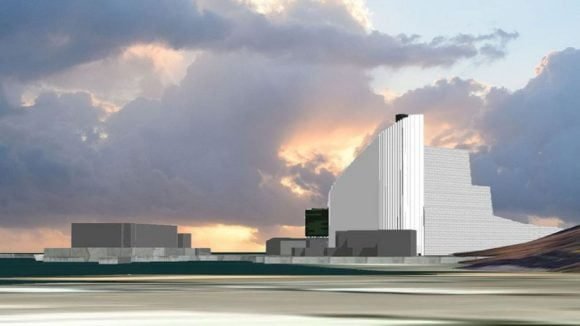The Directors of Powerfuel Portland have provided more details about how the proposed Energy Recovery Facility (ERF) at Portland Port will be a net-zero carbon project for its operational lifetime (up to 30 years).
Powerfuel has now submitted a planning application to develop an ERF to generate 15MW of electricity using up to 202,000 tonnes per annum of RDF as a fuel. In a move that will have implications across the waste and recycling sector, Powerfuel’s commitment is that the Carbon Dioxide (CO2) and other greenhouse gas emissions (GHGs) from the operation of the ERF will be offset, making the project ‘carbon neutral’.
Steve McNab, Director Powerfuel, said: “We believe that it is important that the facility always operates as carbon neutral.
“This is the era of climate emergency and it falls on waste infrastructure developers to look closely at the impact that their activities have. We understand that the ERF in Portland will be the first carbon neutral ERF in the UK and we are very proud to be leading the waste and recycling sector into a new era.”
A comprehensive carbon assessment has been submitted as part of Powerfuel’s environmental impact assessment, which provides accurate figures to demonstrate the facility’s projected annual carbon footprint.
The net-zero commitment will include a minimum financial contribution that will go towards strategies to either offset carbon emissions or fund other emission reducing activities. This will contribute at least £3,000,000 over the operational life of the plant, ring-fenced for GHG reducing activities. The total sum expended could be much higher as the “baseline” will be adjusted dynamically over the operational lifetime of the facility and will likely get “tighter” in future years (for example if and when landfill is banned, and when the grid is more renewable than gas, those will not be the correct baseline assumptions).
Powerfuel Portland is working with carbon offsetting specialist charity Pure Leapfrog to design and then achieve its net-zero carbon status and is currently exploring a range of offsetting and carbon sequestration options.
Claire Hanratty, CEO of Pure Leapfrog, said: “We are very pleased to be working with Powerfuel to develop a fully verified, net-zero carbon programme for its proposed project in Portland. We are looking forward to developing a comprehensive off-setting scheme, supporting projects both locally and globally and ensuring that the Portland ERF has no negative impact on carbon across the lifetime of the project.”
The offsetting will be fully monitored and verified. For example, emission reduction credits will meet the International Carbon Reduction and Offset Alliance (ICROA) ‘Code of Best Practice’ list of quality credible standards for offsetting, whilst forestry offsets and local energy efficiency projects will meet the equivalent national standards.
Steve McNab continued: “Our net-zero commitment is for the lifetime of the project and, working with Dorset Council, our commitment will be assured by use of a planning condition or a Section 106 planning obligation. In the future, once suitable carbon capture technology is available Powerfuel Portland will investigate opportunities to retrofit such equipment at the Energy Recovery Facility to reduce rather than offset.”
“There is also a significant GHG benefit achieved from our “shore power” solution that forms part of the application. That will reduce emissions from docked ships whilst they are fed power from the ERF. When we can connect the ERF to a local district heating system, this will deliver a further reduction in net GHG emissions.”









